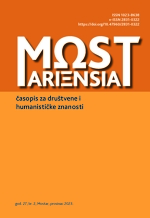NORMATIVNA ANALIZA ELEMENATA KONSOCIJACIJSKE DEMOKRACIJE U BOSNI I HERCEGOVINI
NORMATIVE ANALYSIS OF THE ELEMENTS OF CONSOCIATION DEMOCRACY IN BOSNIA AND HERZEGOVINA
Author(s): Cvija Jurković, Ivan TomićSubject(s): Constitutional Law, Governance, Politics and law, Politics and society, Sociology of Law, Geopolitics
Published by: Sveučilište u Mostaru i Institut društvenih znanosti Ivo Pilar, Zagreb
Keywords: consociational democracy; majority democracy; consensus democracy; divided society; social segments;
Summary/Abstract: In the paper, the authors analyze consociational democracy as a special model of democracy for divided societies. Since there are more social segments in divided societies, the application of the mechanisms of majoritarian democracy can threaten minority segments and thus take on an anti-democratic character. In the paper the authors will define the consociational model of democracy, make a comparison between consociational, consensus and majority democracy and examine the existence of this model at the normative level in Bosnia and Herzegovina. Since there are conflicting opinions as to whether consociational democracy should be applied in Bosnia and Herzegovina, the authors will demonstrate that consociational democracy exists on a normative level by examining the presence of social segments and the four fundamental principles of consociational democracy in the domestic legal order: great coalitions of leaders of all social segments, the autonomy of segments, the principle of proportionality and the veto mechanism for the protection of social segments. The analysis will also show that the mechanisms of consociational democracy, especially the often disputed veto mechanism, did not lead to the establishment of the tyranny of the minority. The vital national interest procedure as a kind of veto mechanism in the House of Peoples of the Parliamentary Assembly of Bosnia and Herzegovina was applied in approximately 90% of cases by the most numerous social segment in Bosnia and Herzegovina. Therefore, the key question is not whether consociational democracy should be applied, but how to improve the efficiency of consociational mechanisms in order to achieve a stable democracy.
Journal: Mostariensia - časopis za društvene i humanističke znanosti
- Issue Year: 27/2023
- Issue No: 2
- Page Range: 145-163
- Page Count: 19
- Language: Croatian

